Planning Fun Activities For Infants And Toddlers
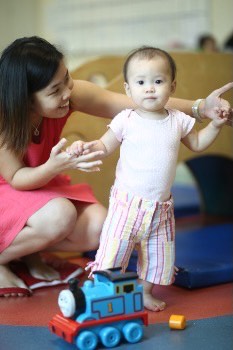
When it comes to planning lessons for infants and toddlers nowadays, the buzzword is meeting the child’s UNIQUE NEEDS. What we need to do, as educators, carers or parents, is to provide responsive caregiving and opportunities for our children to explore age-appropriate materials at their own pace and time. The key is to empower the infant or toddler to follow his or her interest and our role is to be ready to engage him.
Here are some practical tips on how you can plan fun yet activities which are developmentally appropriate for an infant or toddler — but don’t forget, all materials used have to be safe and appropriate to his level of learning.
Use materials that demonstrate cause and effect
These include materials that make a noise when hit or materials that bounce when moved (ensure the noise isn’t too loud, however, try to avoid startling the child). For example, fill a plastic water bottle with oil and coloured water or a plastic water bottle filled with pebbles or stones (securely close each bottle). Watch the amazement in your child’s face.

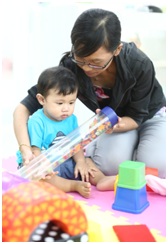
At this stage, infants and toddlers are discovering the world with their five senses. They are also discovering what they can do physically with their bodies. Any safe piece of equipment that they can manipulate and that can cause a reaction goes a long way in teaching them that they have the power to do things.
They are also learning that they are independent beings and discovering that they can do simple tasks or things on their own gradually. Independence, self-identity and autonomy are developed as a result of the introduction of cause and effect materials.
Provide materials which infants and toddlers can use to mimic adult activities
Think of a play corner furnished with home items such as old but clean pots or pans. Create a dress-up corner with hats, handbags and skirts which are easy to put on and off. Or try giving the child a doll or teddy bear.
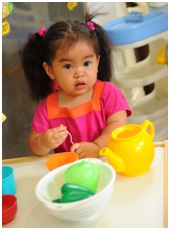

Children can imitate an adult caregiver by learning to care for a favourite toy – they might even enjoy pushing a teddy in a small stroller. Children can learn to share by pretending to feed others when they imitate how an adult prepares food for them and feeds them.
Infants and toddlers are learning all the time and how to function in our world; they look to adults or older siblings to model their behaviour, tone of voice, even mannerisms and even language. Their sense of belonging and connections to people around them is important to develop trust and secure attachment which is fundamental at this developmental phase.
Provide lots of space for movement and dancing
Infants and toddlers need to move. They do not understand “Wait, we will go outdoors.” They only know that they need to move NOW. As they change from “on the spot” to “on the go” babies, they cannot contain their eagerness to explore on their own. It is all part of their development and the motivation to learn and grow.
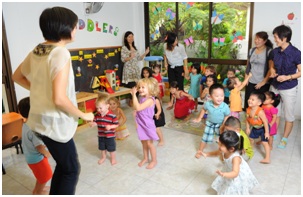

Play songs with movement and move with the infants and toddlers who are interested. Trying varying the genres of music and encourage the child to move according to the rhythm or tempo. Try moving like animals or singing while dancing.
Only when a lot of opportunities for large muscle movements are provided can a child learn to be move safely within a given space. The best place for any infant or toddler is on the flat floor.
Always be ready to read a book, sing a song, recite a rhyme or have a conversation with your child
Board books and picture books are ideal for this — but don’t forget, books need to be durable. You may even want to make puppets using socks to resemble the main character of the book or rhyme so as to engage the infants and toddlers further.

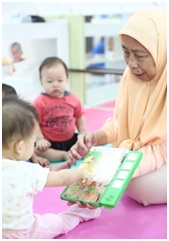
Infants and toddlers are at the peak of language acquisition. They are highly motivated to communicate to have their needs met. When surrounded by stimulating language and text, they foster the disposition to learn and construct new knowledge. This disposition for learning can in turn develop their sense of curiosity about the world and nurture a positive attitude towards problem-solving.
For an example on how to interact with a child using a material chosen by him, click here
Finally, the biggest tip to remember is that infants and toddlers have a very strong drive to be independent, choose for themselves what they are interested in and explore. They will also use the materials in their own unique way. So don’t be surprised if the activities you planned are replaced by an activity that the infants and toddlers have discovered themselves — just go with the flow. Tune in to your child’s needs
Unlike pre-schoolers, infants and toddlers will only go when they are ready and when they want to. So remember to make allowances for different children to engage in different materials. It’s your responsibility as the teacher, caregiver or parent to be observant and ready to respond the cues and interest of the children so as to be able to make necessary changes to the materials or environment as necessary.
Ms Geraldine Teois an Education Development Specialist with The Little Skool-House International. At present, her area of specialization is in the birth to three years. Geraldine holds a Master of Science and has 10 years of working experience with young children, having been a teacher, managed centres and developed curriculum for pre-schoolers. In 2008, Geraldine presented on a project initiated by her children on – Red Chilli at the MCYS Conference as well as the NAEYC Conference in Dallas, USA.
Ms Chua King Loo, the managing director of a preschool centre in the East, has been in the education field for more than 12 years. She earned her Academic Degree from the National University of Singapore, and pursued her second Degree from Edith Cowan University, specializing in Childhood Education and Family Services. She obtained her Master Degree with the National Institute of Education, Nanyang Technological University and a Diploma of Educational Studies from The College of Teachers, London. |
You may also like

From Cabin to Classroom: Journey of an Outstanding Early Childhood Educator
The PDP modules allowed me to get creative with lesson ideas and keep up with the ever-changing Early Childhood sector.

Ms Farhana Binte Mohamed Hassan
Early Years Educator - PCF Sparkletots @ Pioneer Block 987D (CC)

More Than Just a Place for Food
Young children are highly inquisitive, and learn most effectively with activities that allow exploration and experimentation.

Kinderland @ Yio Chu Kang

Little Fingers Create Great Art - A Community Project by Kinderland and Skool4kidz
I believe this collaborative effort is a very meaningful contribution to the SG50 celebrations.

Kinderland and Skool4Kidz